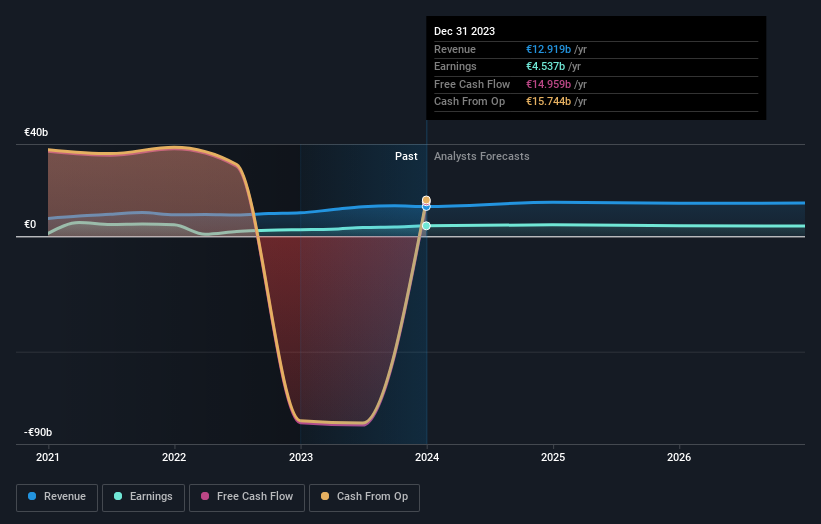Stock Analysis
Private companies in CaixaBank, S.A. (BME:CABK) are its biggest bettors, and their bets paid off as stock gained 3.5% last week

Key Insights
- The considerable ownership by private companies in CaixaBank indicates that they collectively have a greater say in management and business strategy
- 50% of the business is held by the top 2 shareholders
- Institutions own 22% of CaixaBank
To get a sense of who is truly in control of CaixaBank, S.A. (BME:CABK), it is important to understand the ownership structure of the business. The group holding the most number of shares in the company, around 50% to be precise, is private companies. That is, the group stands to benefit the most if the stock rises (or lose the most if there is a downturn).
Clearly, private companies benefitted the most after the company's market cap rose by €1.2b last week.
Let's delve deeper into each type of owner of CaixaBank, beginning with the chart below.
View our latest analysis for CaixaBank

What Does The Institutional Ownership Tell Us About CaixaBank?
Many institutions measure their performance against an index that approximates the local market. So they usually pay more attention to companies that are included in major indices.
We can see that CaixaBank does have institutional investors; and they hold a good portion of the company's stock. This suggests some credibility amongst professional investors. But we can't rely on that fact alone since institutions make bad investments sometimes, just like everyone does. If multiple institutions change their view on a stock at the same time, you could see the share price drop fast. It's therefore worth looking at CaixaBank's earnings history below. Of course, the future is what really matters.

We note that hedge funds don't have a meaningful investment in CaixaBank. Fundación Bancaria Caixa d'Estalvis i Pensions de Barcelona, la Caixa is currently the largest shareholder, with 33% of shares outstanding. BFA Tenedora de Acciones S.A.U. is the second largest shareholder owning 18% of common stock, and BlackRock, Inc. holds about 5.1% of the company stock.
After doing some more digging, we found that the top 2 shareholders collectively control more than half of the company's shares, implying that they have considerable power to influence the company's decisions.
While it makes sense to study institutional ownership data for a company, it also makes sense to study analyst sentiments to know which way the wind is blowing. Quite a few analysts cover the stock, so you could look into forecast growth quite easily.
Insider Ownership Of CaixaBank
The definition of company insiders can be subjective and does vary between jurisdictions. Our data reflects individual insiders, capturing board members at the very least. Management ultimately answers to the board. However, it is not uncommon for managers to be executive board members, especially if they are a founder or the CEO.
Most consider insider ownership a positive because it can indicate the board is well aligned with other shareholders. However, on some occasions too much power is concentrated within this group.
Our information suggests that CaixaBank, S.A. insiders own under 1% of the company. But they may have an indirect interest through a corporate structure that we haven't picked up on. As it is a large company, we'd only expect insiders to own a small percentage of it. But it's worth noting that they own €7.3m worth of shares. Arguably recent buying and selling is just as important to consider. You can click here to see if insiders have been buying or selling.
General Public Ownership
The general public-- including retail investors -- own 28% stake in the company, and hence can't easily be ignored. This size of ownership, while considerable, may not be enough to change company policy if the decision is not in sync with other large shareholders.
Private Company Ownership
We can see that Private Companies own 50%, of the shares on issue. It might be worth looking deeper into this. If related parties, such as insiders, have an interest in one of these private companies, that should be disclosed in the annual report. Private companies may also have a strategic interest in the company.
Next Steps:
While it is well worth considering the different groups that own a company, there are other factors that are even more important. Case in point: We've spotted 2 warning signs for CaixaBank you should be aware of, and 1 of them doesn't sit too well with us.
Ultimately the future is most important. You can access this free report on analyst forecasts for the company.
NB: Figures in this article are calculated using data from the last twelve months, which refer to the 12-month period ending on the last date of the month the financial statement is dated. This may not be consistent with full year annual report figures.
Valuation is complex, but we're helping make it simple.
Find out whether CaixaBank is potentially over or undervalued by checking out our comprehensive analysis, which includes fair value estimates, risks and warnings, dividends, insider transactions and financial health.
View the Free AnalysisHave feedback on this article? Concerned about the content? Get in touch with us directly. Alternatively, email editorial-team (at) simplywallst.com.
This article by Simply Wall St is general in nature. We provide commentary based on historical data and analyst forecasts only using an unbiased methodology and our articles are not intended to be financial advice. It does not constitute a recommendation to buy or sell any stock, and does not take account of your objectives, or your financial situation. We aim to bring you long-term focused analysis driven by fundamental data. Note that our analysis may not factor in the latest price-sensitive company announcements or qualitative material. Simply Wall St has no position in any stocks mentioned.
About BME:CABK
CaixaBank
CaixaBank, S.A., together with its subsidiaries, provides various banking products and financial services in Spain and internationally.
Solid track record established dividend payer.

